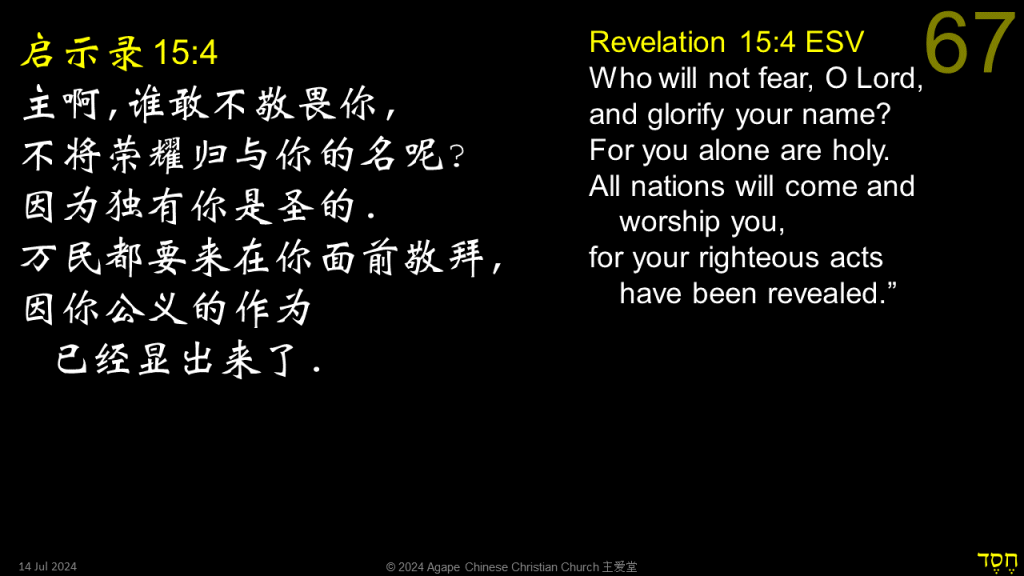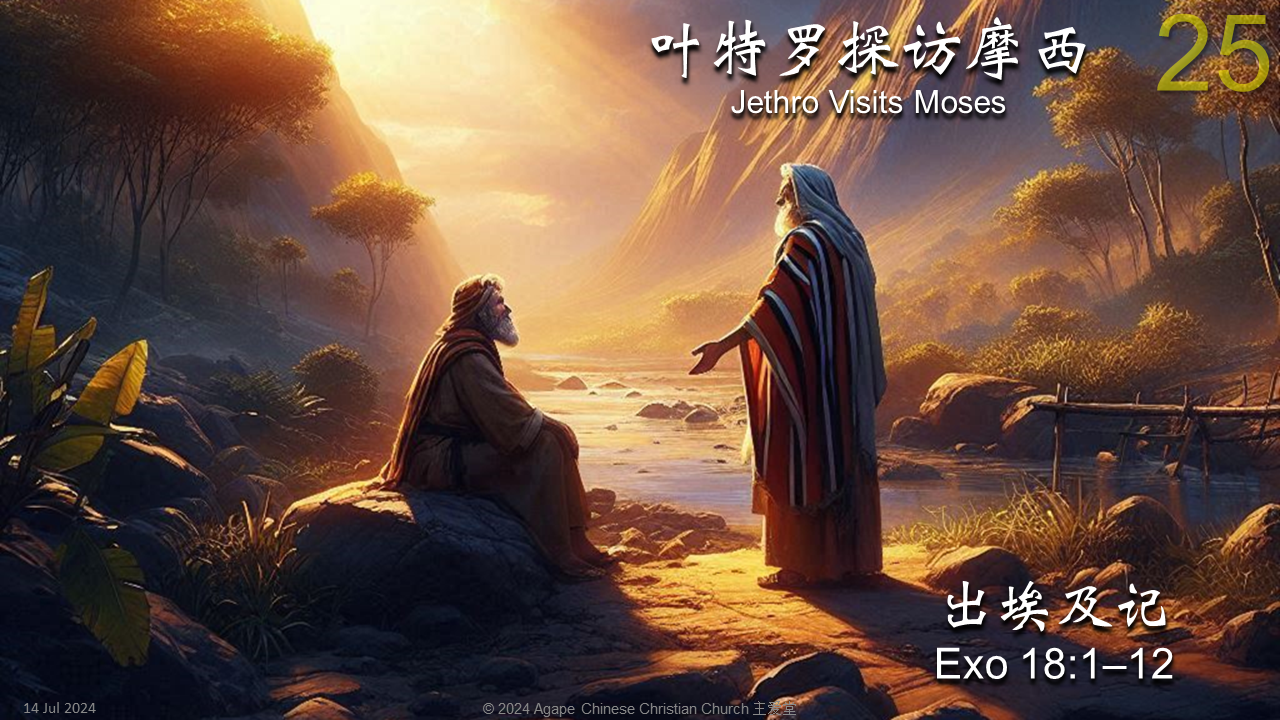叶特罗探访摩西 Jethro Visits Moses
出埃及记 Exo 18:1–12
Remember these points
I put these points at the top of my sermon-prep template to remind myself every week:
- Show that main point of passage relates to Jesus and his saving work
- (1 Cor 1:18) A truly gospel-centred message will not be acceptable in a synagogue or mosque
- Did I proclaim the gospel as the headline news of the sermon, rather than as a “by the way…”?
- Unbelievers are called to repent, believe, and be saved
- Believers are encouraged to abandon their old self, renew their minds, put on the new self in Christ
- Preach simple sermons, so that God’s people can see Christ more clearly and love him more dearly
News
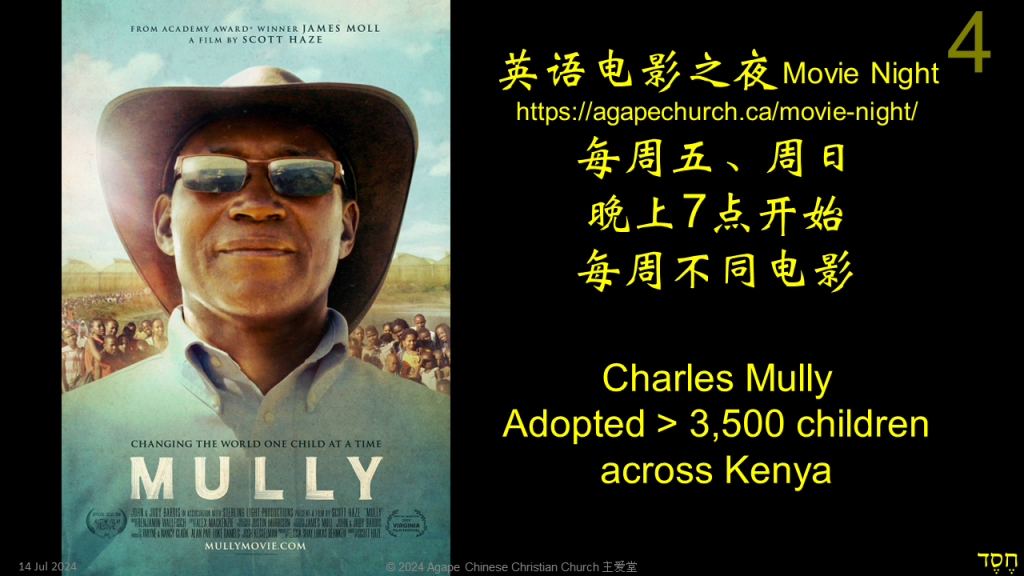
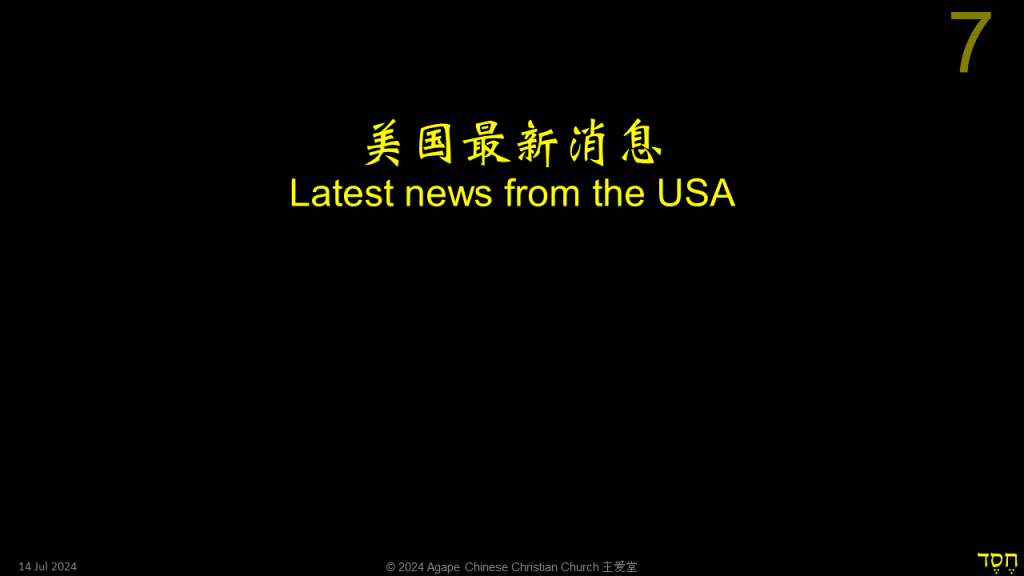
Recap of Last Sermon
This was the sermon of 240707.
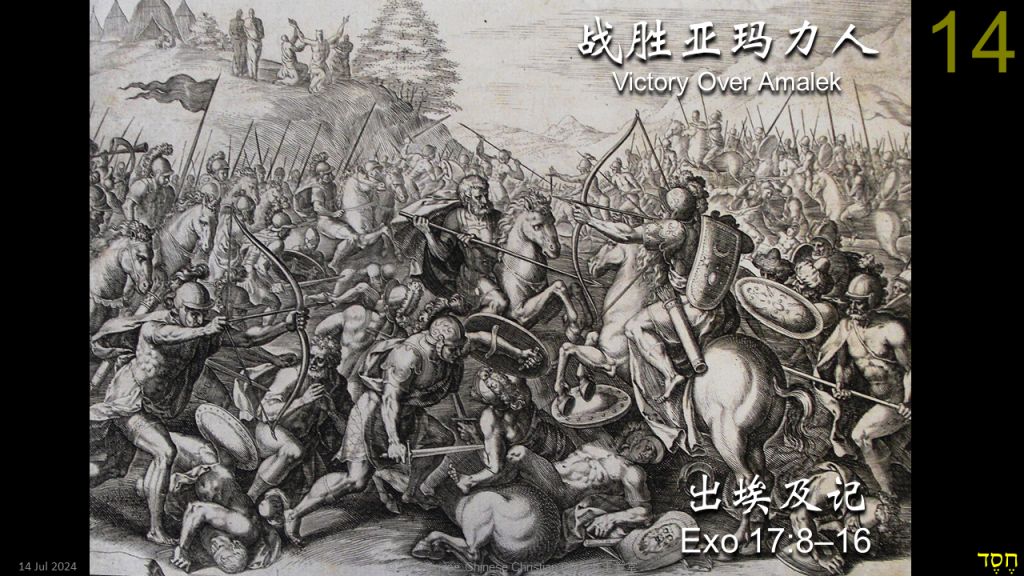
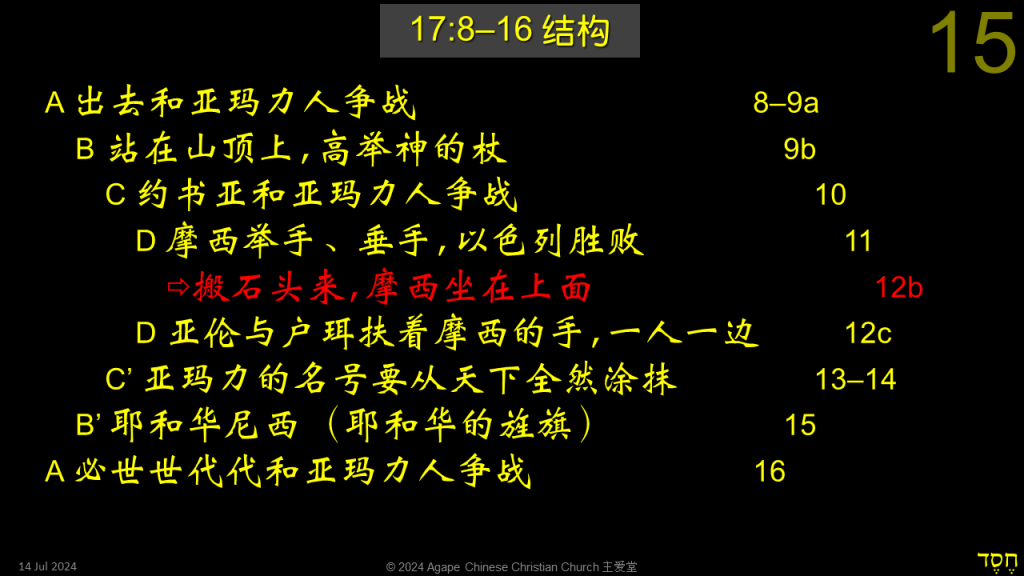
The passage is a chiasm, the centre of which is Moses sitting down on the rock (Exo 17:12b).
Some people say Moses together with Aaron and Hur on the hilltop is like the crucifixion scene,
with Christ in the middle and the two thieves on either side. I think this is a very improper way to look for Christ in the OT!
Some observations on this:
- Moses had to sit, he wasn’t lifted up (though the staff of God was lifted up).
- Neither Aaron nor Hur were thieves!
- One of the thieves believed in Jesus, the other didn’t. Neither of them helped Jesus in any way.
More Lessons from Last Sermon
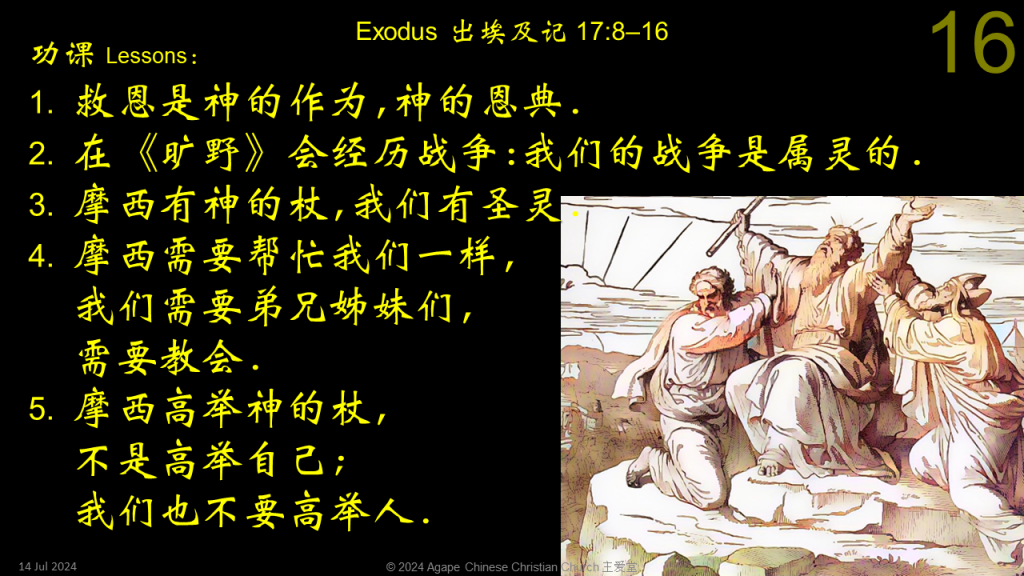
- Salvation is from God, it’s God’s grace.
- In “the wilderness,” there will be battles: our battles are spiritual (so even more dangerous than physical battles).
- Moses had God’s staff, we have something better: we have the Holy Spirit to help us fight.
- Moses needed help while he was on the hill, we’re the same.
We need brothers and sisters, we need the church. - Moses lifted up the staff of God, not himself;
we also shouldn’t lift up ourselves or other humans.
Hook
Part of the hook for today: Where have we seen this storyline before…?
- God’s people threatened.
- There’s a battle. God miraculously saved his people.
- A priest showed up to give blessing and to celebrate.
- A covenant with God is made.
The hardest people to evangelise are…?
Most of us would answer that it’s our family members that are hardest to evangelise.
Where have we seen this storyline before?
Back in Gen 14, when Abraham’s nephew Lot and family were captured by five foreign kings.
Abraham gave chase, and God allowed them to defeat the group of five kings.
Melchizedek (Gen 14:18) appeared out of nowhere (well, he’s actually from Salem), brought bread and wine.
Melchizedek gave the blessing (he knows who YHWH is).
Right after this incident, YHWH made a covenant with Abraham.
Passage
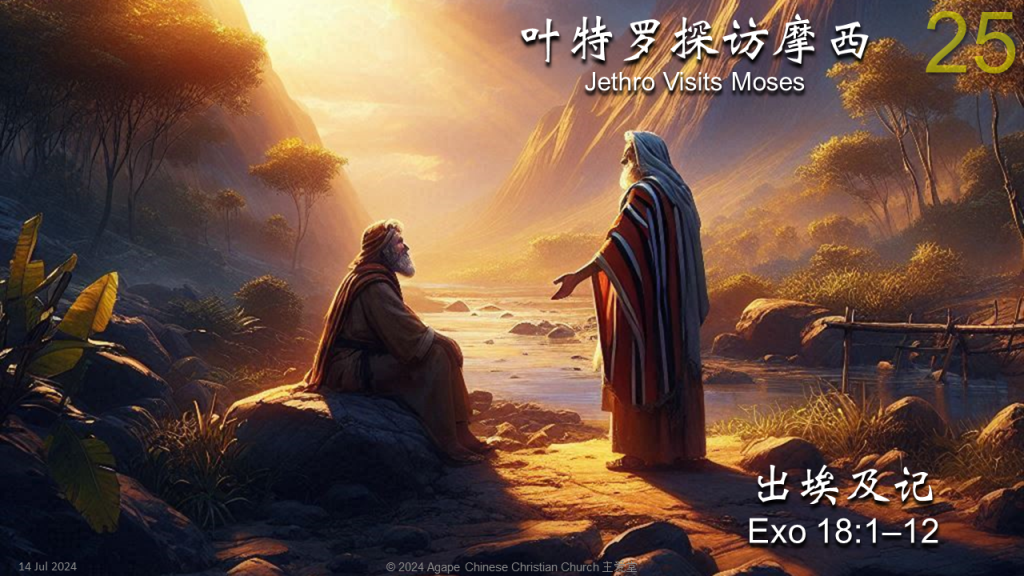
The picture was generated by Microsoft Copilot. I asked for “generate painting of Moses meeting Jethro, 1920×1080 resolution.”
Click here for English Scripture text
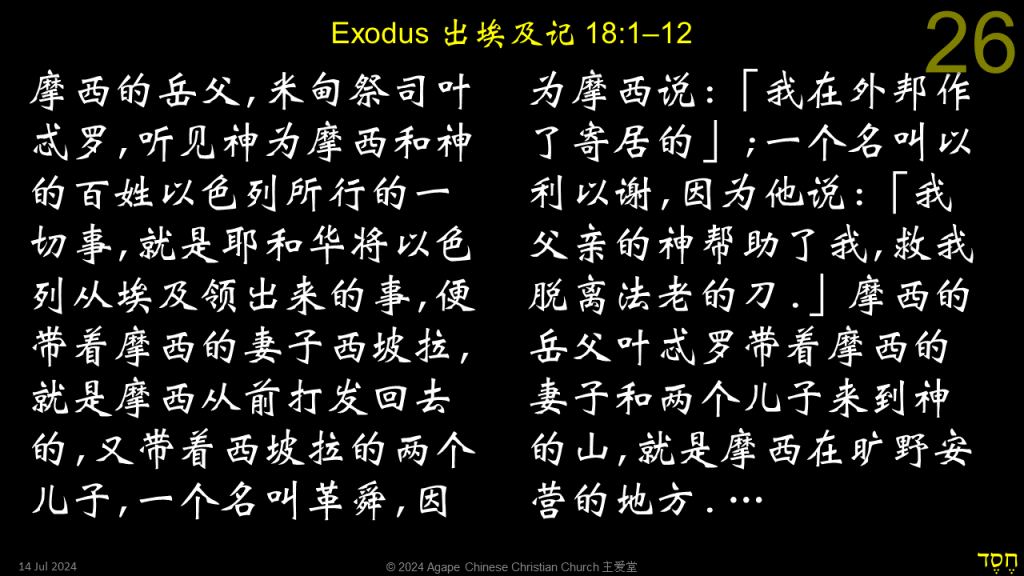
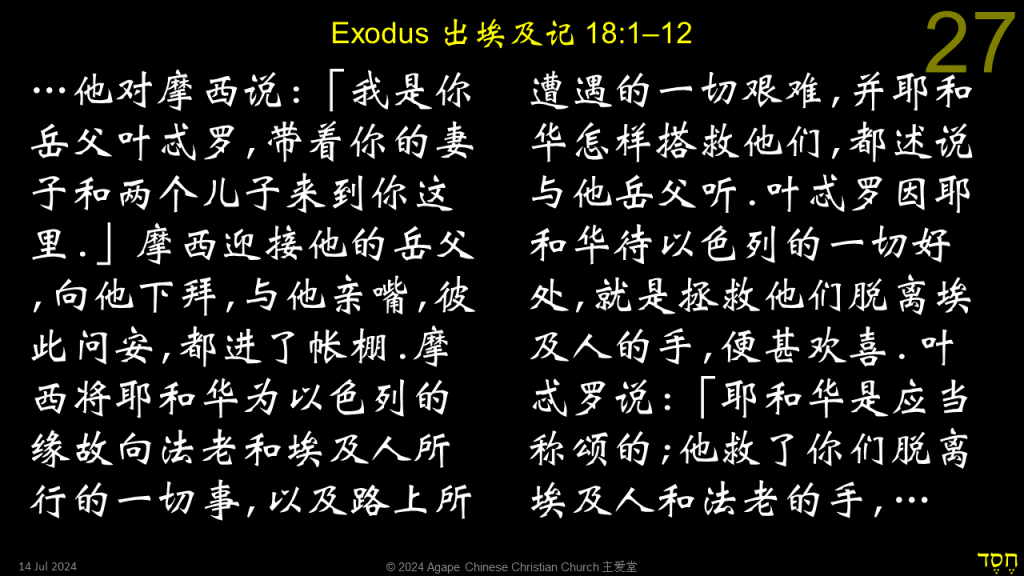
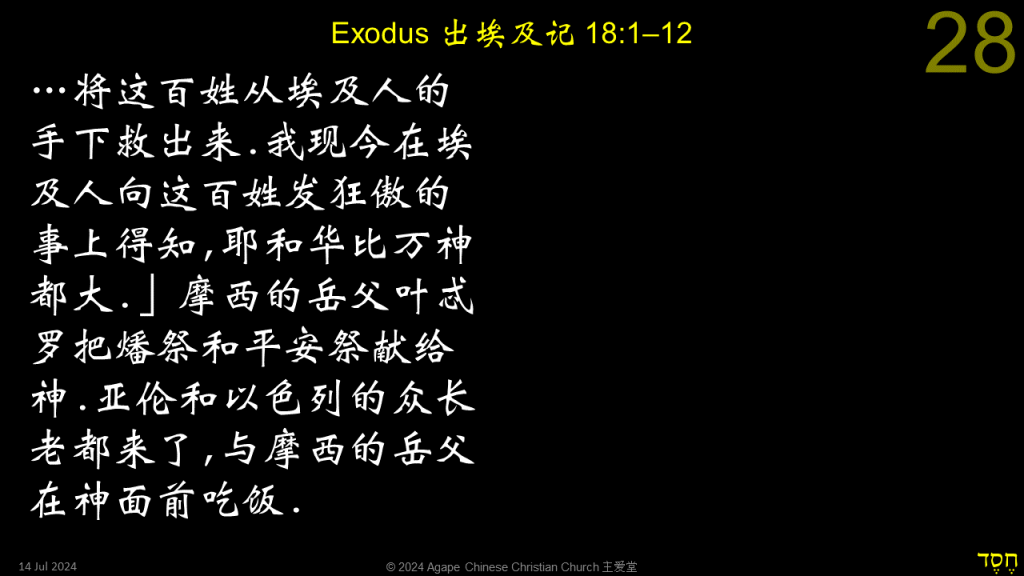
English Version
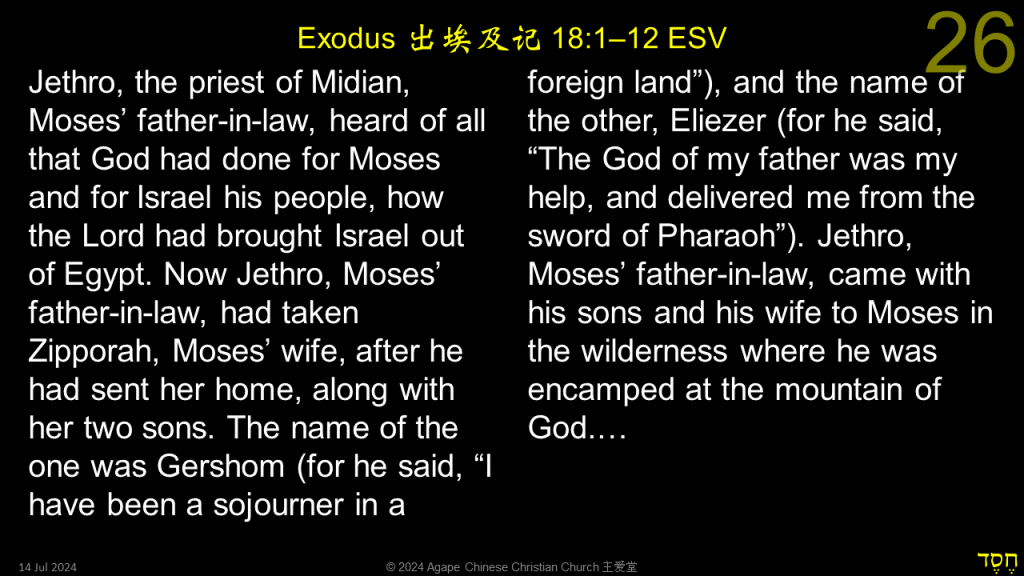
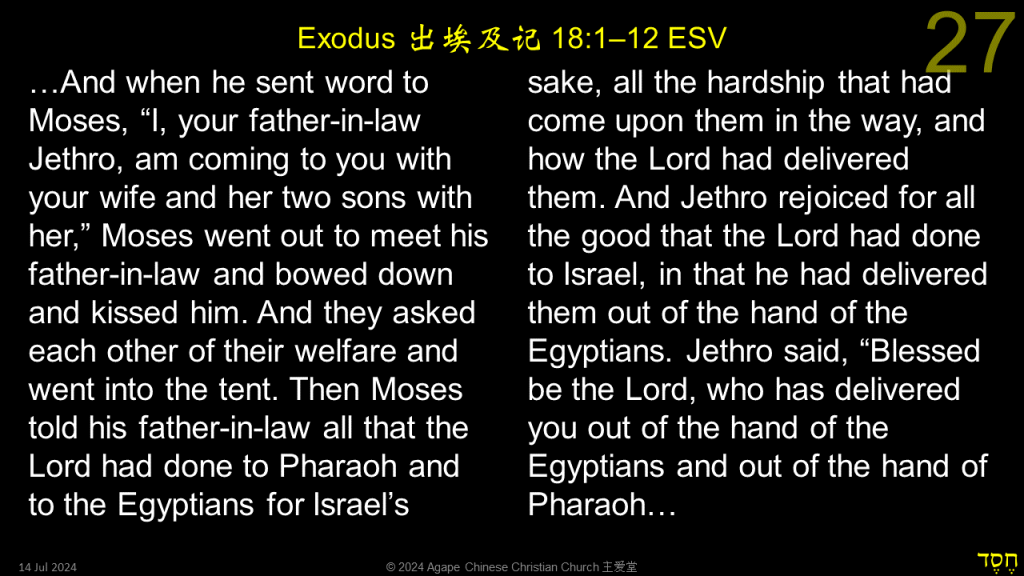
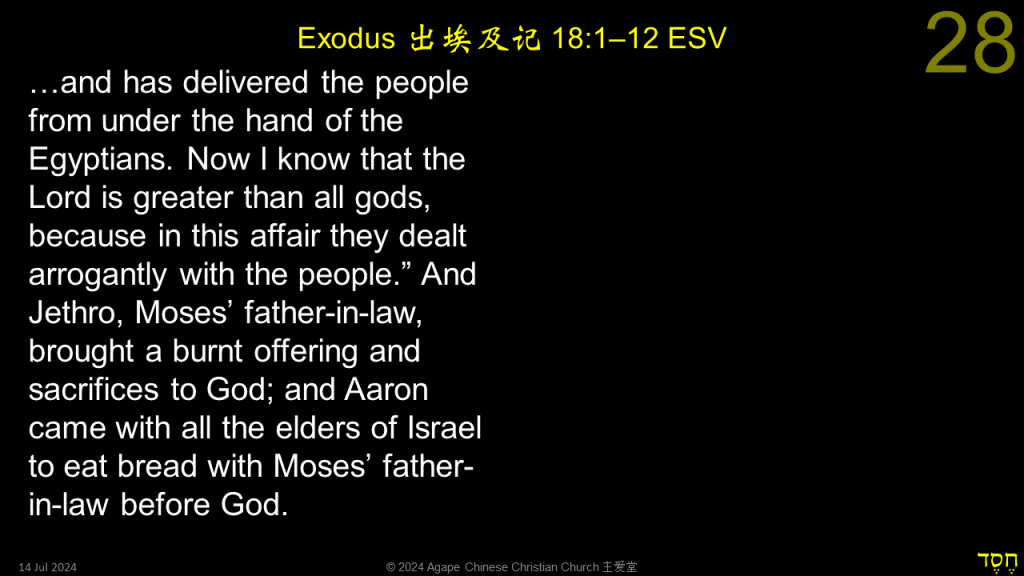
Outline
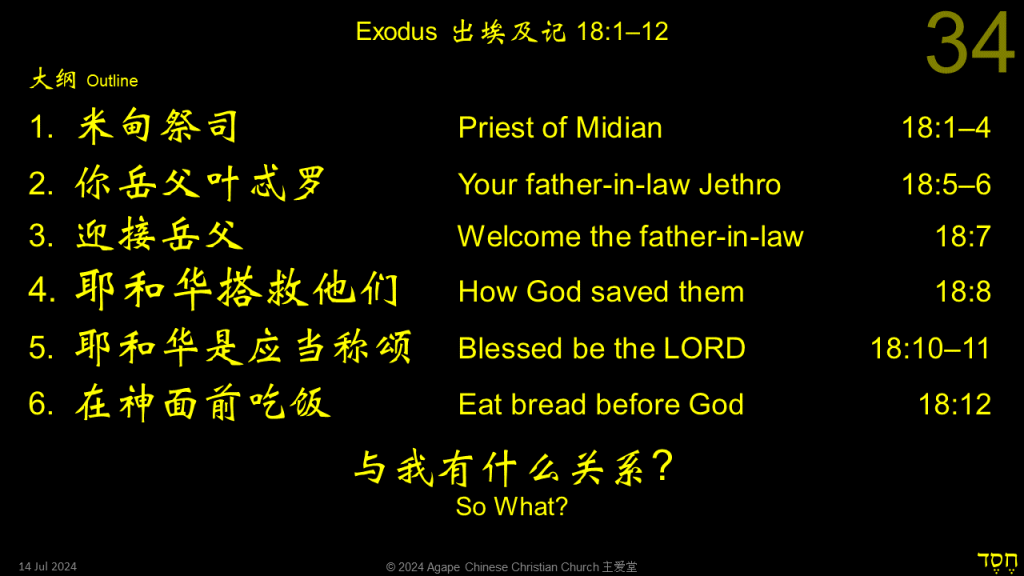
Section 1 米甸祭司 Priest of Midian 18:1–4
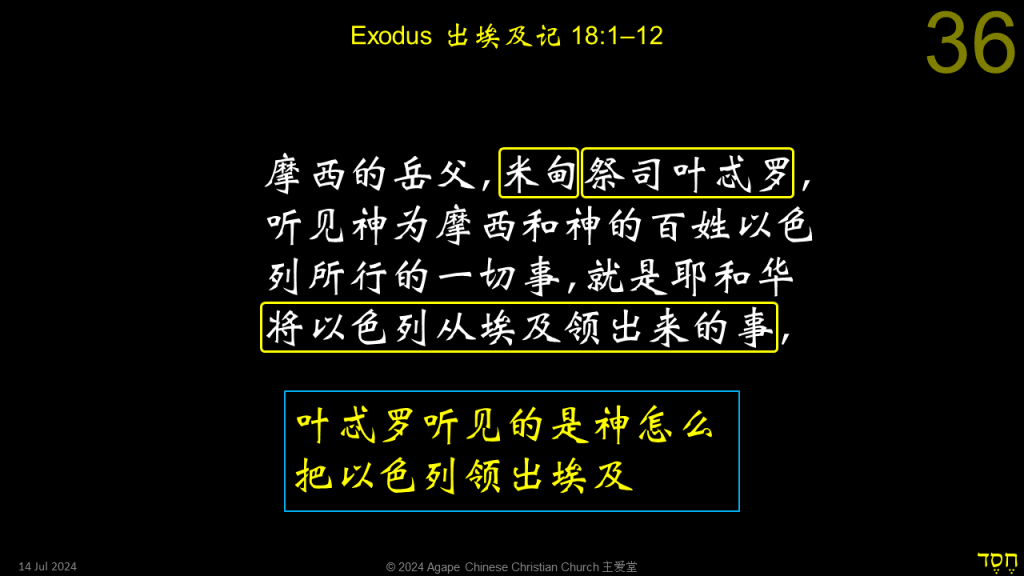
Jethro was Moses’ father-in-law, as this passage was so careful to point out several times.
The passage also stressed that he’s a priest of Midian. What can we understand from this description of him?
Where have we heard of Jethro before?
It was back in Exo 2, when Moses escaped from Egypt and settled in Midian.
Jethro heard how God brought the Israelites out of Egypt (no small feat).
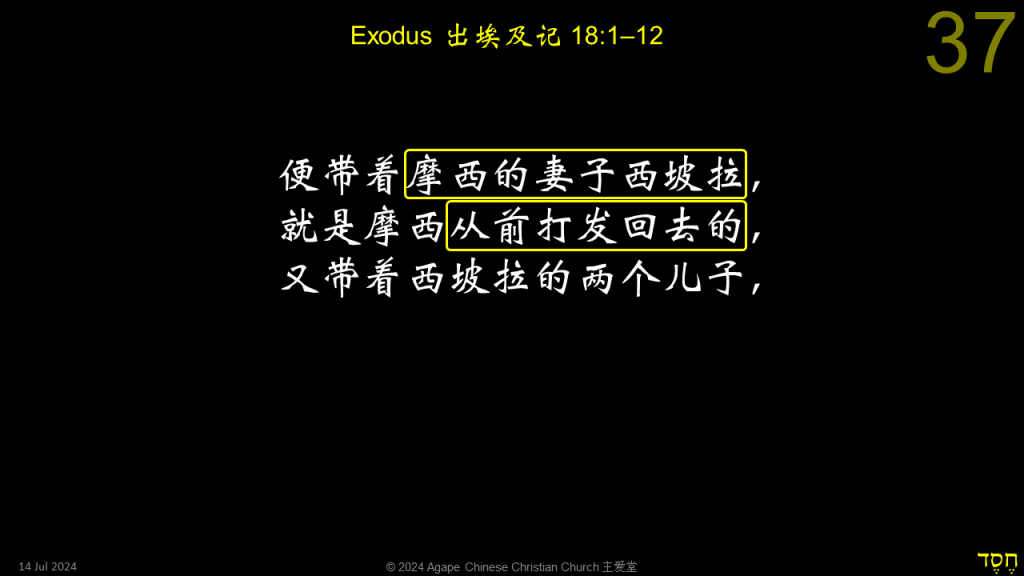
Moses sent Zipporah and Gershom back to her family earlier, but we don’t know when.
Some said it was right after the incident of God wanting to kill Moses while the latter was on his way back to Egypt (Exo 4:24–26).
Others said it was right after the Red Sea crossing.
I prefer the 2nd option, as the 1st one would mean Moses wanted to keep his family and young Gershom safe, while he goes back to convince Pharaoh to release the Israelites. This doesn’t sound very trusting of Moses!
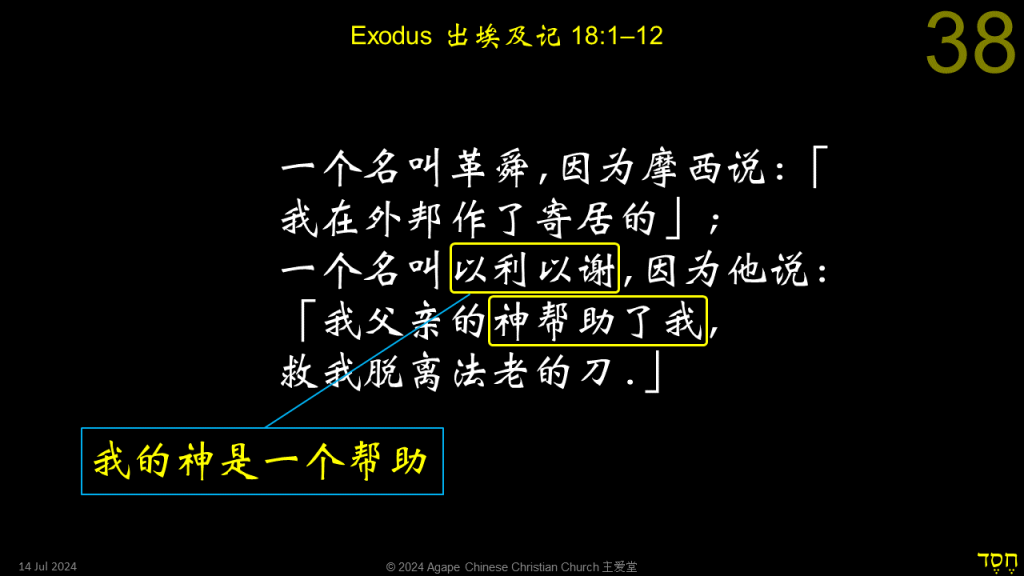
Gershom we knew already (from Exo 2:22), Eliezer we heard for the 1st time.
Eliezer means “My God is a help.” Just remember “ezer” throughout the Bible is the transliteration of “help” in Hebrew.
“El” is God (though not necessarily referring to YHWH).
Lessons
Section 2 你岳父叶忒罗 Your father-in-law Jethro 18:5–6
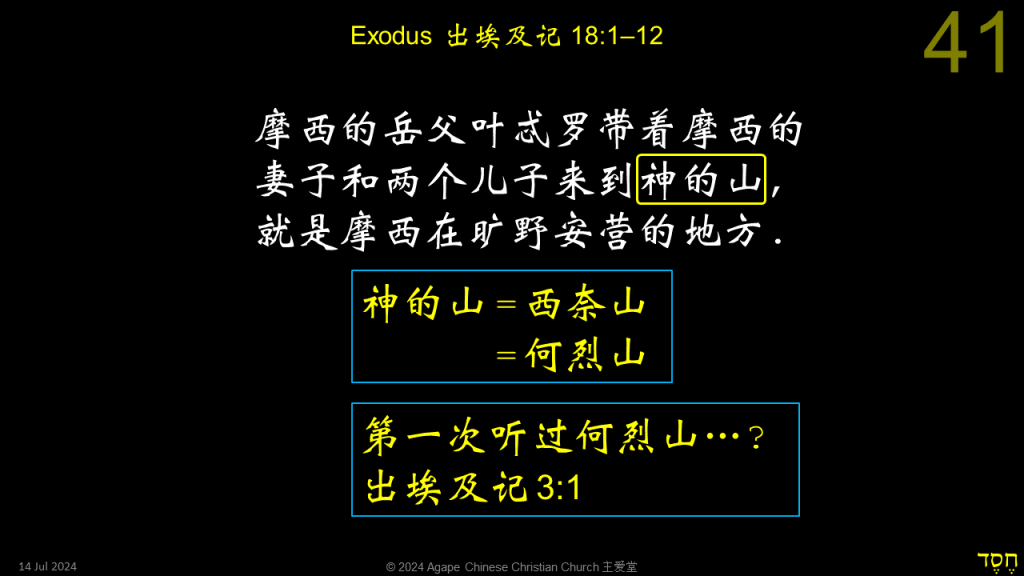
Mountain of God = Mount Sinai, or Mount Horeb (Exo 3:1; 17:6).
First mention of Horeb was back in Exo 3:1, when Moses encountered the burning bush.
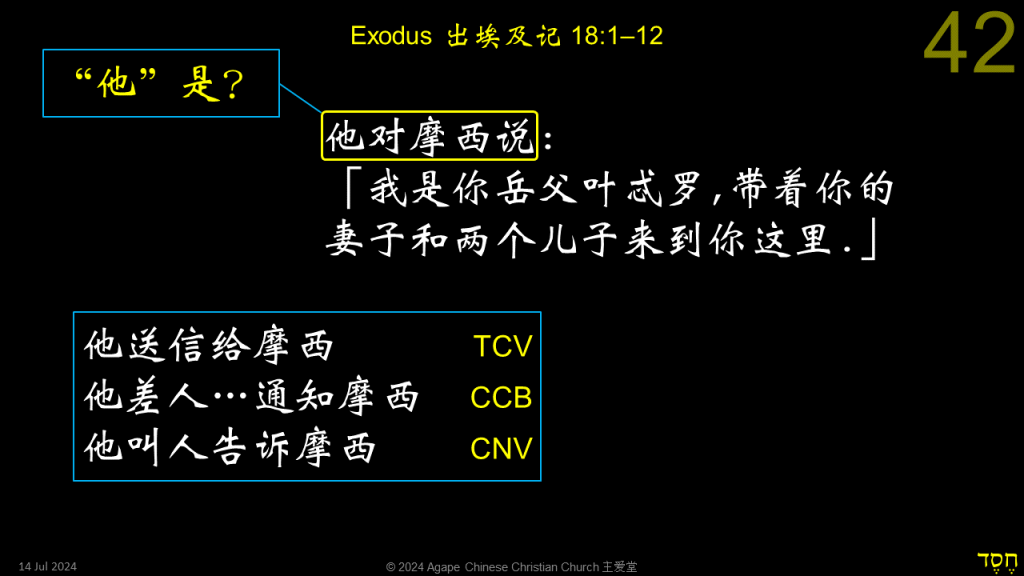
This slide is mainly about a translation problem with the CUV.
In all newer Chinese translations (TCV, CCB, CNV, etc.), the issue has been fixed. Modern English versions (ESV, NIV, NET, etc.) don’t have this problem.
The way the CUV has it, it sounds like Jethro spoke directly to Moses (as if Moses doesn’t recognise his own father-in-law!)
Lessons
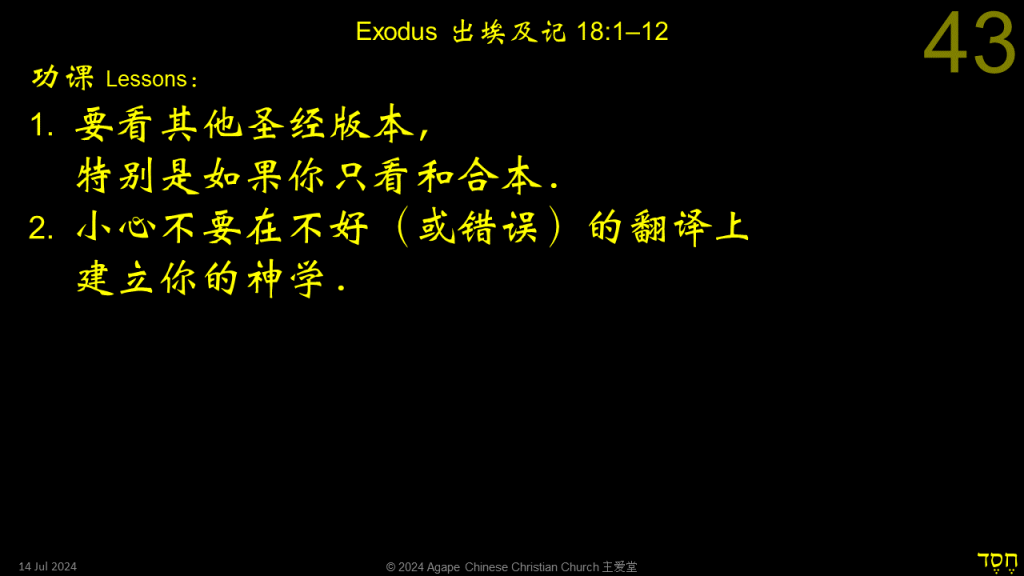
- Always read more than one Bible version, especially when you read in Chinese (so don’t read just the CUV).
- Don’t base your theology or biblical teaching on erroneous translations.
Section 3 迎接岳父 Welcome the father-in-law 18:7
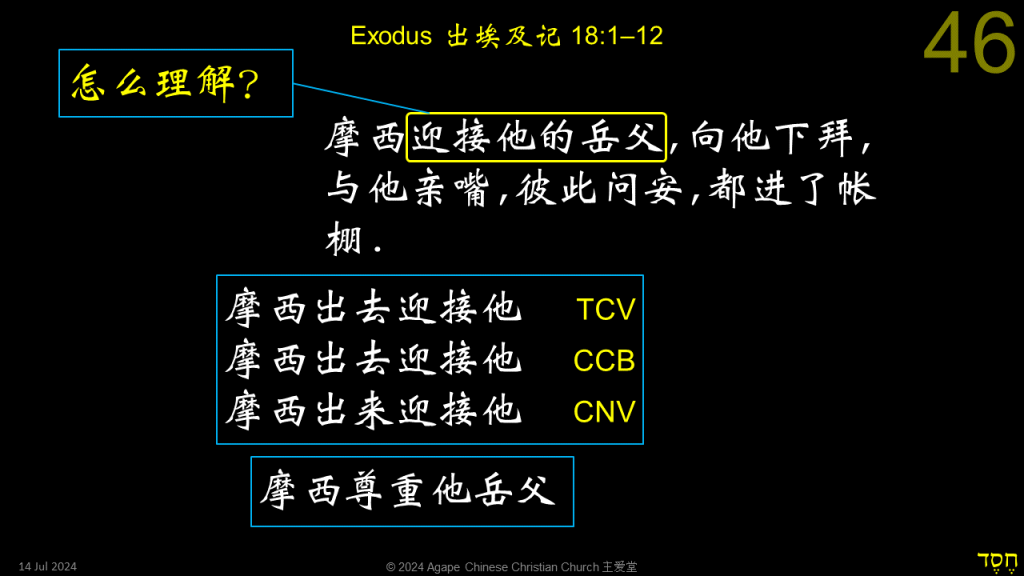
This is another instance of translation problems with the CUV.
The CUV didn’t translate “went out,” (Exo 18:7) so it sounds like Moses simply greeted Jethro at the former’s tent. All other modern Chinese translations have “出去” or “出来.”
Adding “went out” makes all the difference, as it showed that Moses deferred to Jethro (his senior), going out to meet him, instead of just sitting in his tent waiting for Jethro to show up.
Lessons
Section 4 耶和华搭救他们 How God saved them 18:8
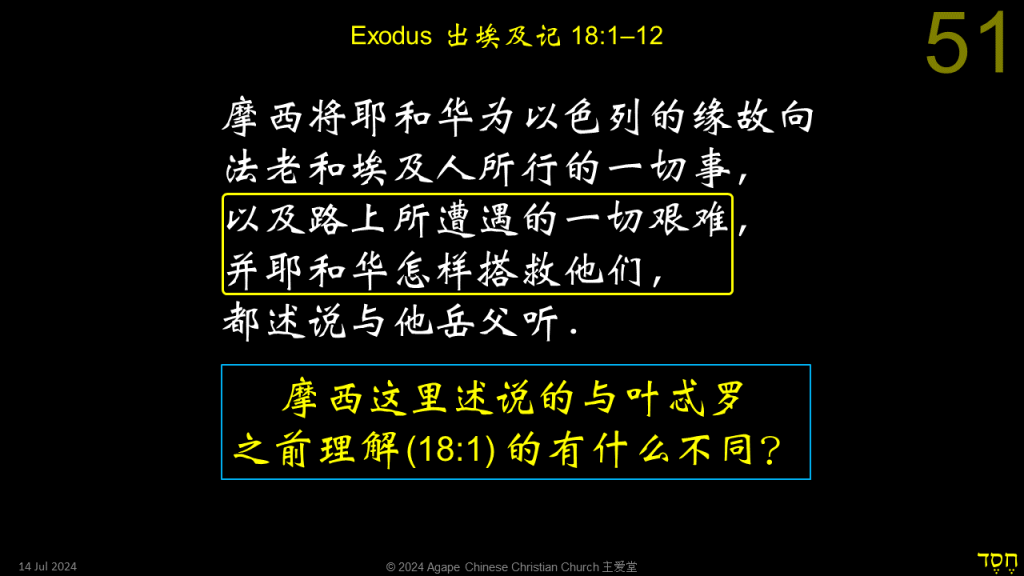
This is Exo 18:8.
What’s different about what Moses describes (to Jethro) in this verse and what Jethro understood in Exo 18:1?
In Exo 18:1, Jethro only knew that YHWH brought them out of Egypt.
Here, Moses told him all the things that YHWH did for them in the wilderness.
This would include the manna and quail, lack of water (twice), etc.
Do you think Moses would also tell Jethro about how immature and unfaithful the people were?
Lessons
Section 5 耶和华是应当称颂 Blessed be the LORD 18:10–11
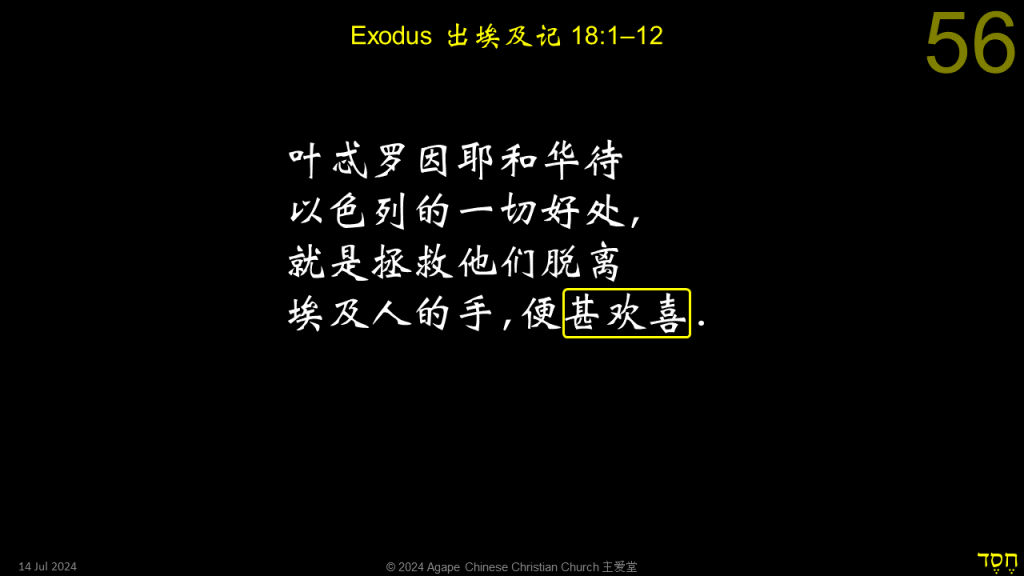
Jethro was joyful because of what YHWH did. I think it’s also because he now knows who YHWH is.
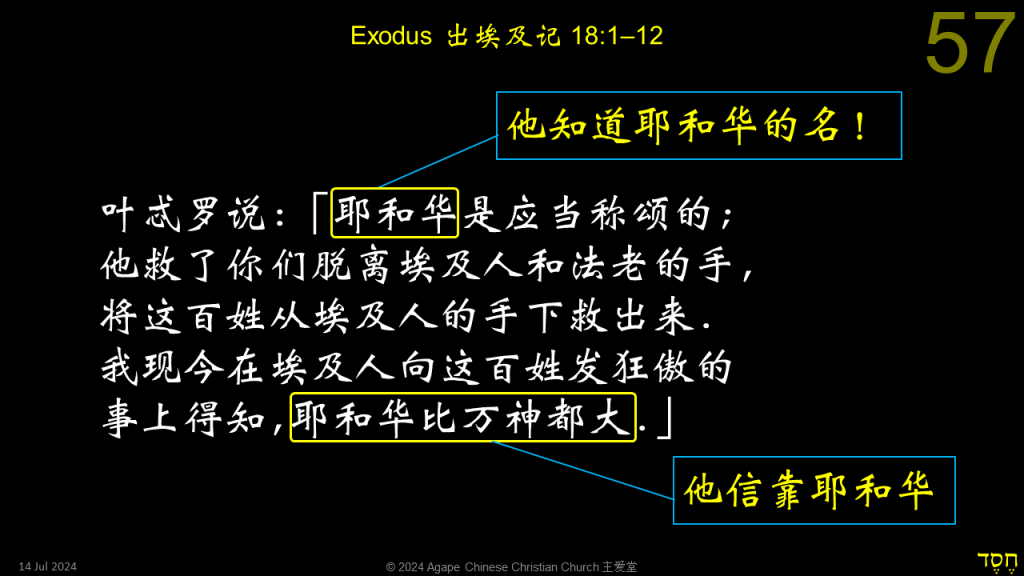
He knows YHWH’s name! Earlier, it was just the generic God (elohim), not YHWH.
Lessons
Section 6 在神面前吃饭 Eat bread before God 18:12
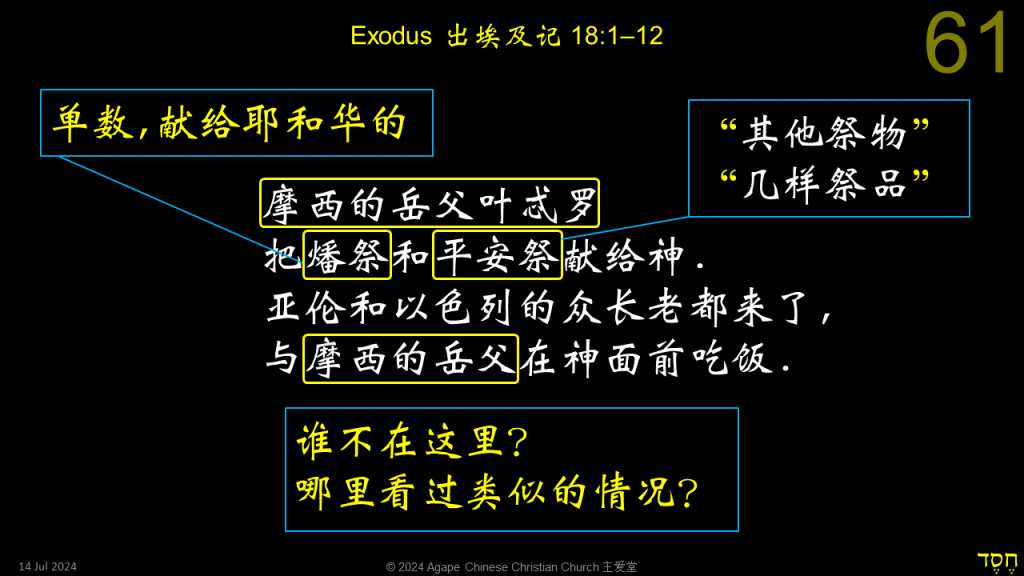
No mention of “priest of Midian.” Jethro now believes in YHWH.
The burnt offering (燔祭) is singular, it’s offered entirely to God, they don’t get to eat any of it.
The other “sacrifices” will be part of the communal meal, shared with all the leaders in celebration and communion.
Again, I have a slight issue with the CUV. It translates “sacrifices” as “peace offering.” Other modern Chinese translations keeps the proper meaning of generic “sacrifice,” so 其他祭物 (other sacrifices) or 几样祭品 (a few sacrificial items).
It’s like our Lord’s Supper, a communal sharing of the Lords bread and cup.
In the list of people who shared the celebratory meal, who’s missing?
Does this situation sound familiar? Where have we heard this before? We’ll take this up next time…
与我有什么关系? So What?
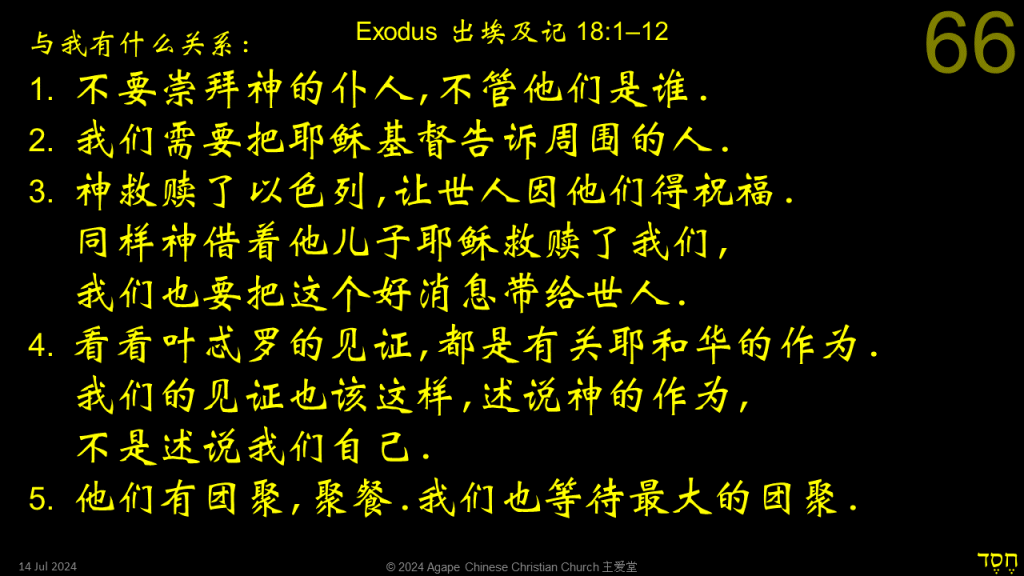
- Don’t idolise God’s servants, no matter who they might be.
- We need to tell others about Jesus Christ. So evangelism.
- God redeemed the Israelites, so that through them, the world will be blessed.
In the same way, God redeemed us through his son Jesus Christ,
we also need to share this good news with the world. - Look at Jethro’s testimony (Exo 18:10–11), it’s all about what God has done.
Our testimonies should be the same, telling others of what God has done,
not about ourselves. - They had a reunion. We’re all looking forward to the ultimate reunion!
